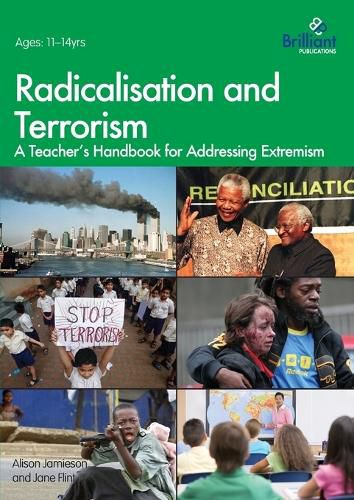Readings Newsletter
Become a Readings Member to make your shopping experience even easier.
Sign in or sign up for free!
You’re not far away from qualifying for FREE standard shipping within Australia
You’ve qualified for FREE standard shipping within Australia
The cart is loading…






This title is printed to order. This book may have been self-published. If so, we cannot guarantee the quality of the content. In the main most books will have gone through the editing process however some may not. We therefore suggest that you be aware of this before ordering this book. If in doubt check either the author or publisher’s details as we are unable to accept any returns unless they are faulty. Please contact us if you have any questions.
The Counter-Terrorism and Security Act (February 2015) makes it compulsory for schools to implement anti-radicalisation measures to help prevent young people from being drawn into terrorism. As the increasingly frequent press stories of school children being radicalised show, teachers urgently need a resource that enables them to recognise, debate and disrupt extremist narratives within the context of the classroom. This practical handbook provides a reliable and objective resource to enable lower secondary school teachers to tackle the complex subjects of terrorism and radicalisation with confidence. It sets political violence within a broad context of perceived injustice, using familiar emotions of anger and disappointment to introduce the notion of grievance, a precursor of all forms of terrorism.
The text covers issues of citizenship, human rights and respect, civil and political engagement, the nature of identity and how we identify with others. It examines different forms of violence from bullying to the most recent examples of 21st century terrorism. Historical precedent is used to illustrate a variety of contexts in which political violence has occurred, from Assassins through Suffragettes to militancy in South Africa, Europe, the Middle East and Oceania. The handbook considers the causes and consequences of terrorism and helps teachers to explain to children what terrorists do and why they do it; how to differentiate between the reasons, goals and methods of terrorists; why the media and terrorism are inextricably linked; what makes terrorism start and, crucially, what factors bring a cycle of terrorism to an end. Pupils are invited to reflect on the destructiveness of terrorism for both victims and aggressors and, taking Northern Ireland and South Africa as examples, to consider the process of reconciliation. The handbook tackles the problem of defining ‘terrorism’, a term which is value-laden and subjective, and which has eluded international consensus. Pupils are encouraged to explore the reasons for this, and to debate fact and bias through an examination of the role of the media in reporting terrorism. The role of social media within the process of radicalisation is also studied. Fictional storylines and classroom activities are provided to stimulate creative thinking and interactive participation.
$9.00 standard shipping within Australia
FREE standard shipping within Australia for orders over $100.00
Express & International shipping calculated at checkout
This title is printed to order. This book may have been self-published. If so, we cannot guarantee the quality of the content. In the main most books will have gone through the editing process however some may not. We therefore suggest that you be aware of this before ordering this book. If in doubt check either the author or publisher’s details as we are unable to accept any returns unless they are faulty. Please contact us if you have any questions.
The Counter-Terrorism and Security Act (February 2015) makes it compulsory for schools to implement anti-radicalisation measures to help prevent young people from being drawn into terrorism. As the increasingly frequent press stories of school children being radicalised show, teachers urgently need a resource that enables them to recognise, debate and disrupt extremist narratives within the context of the classroom. This practical handbook provides a reliable and objective resource to enable lower secondary school teachers to tackle the complex subjects of terrorism and radicalisation with confidence. It sets political violence within a broad context of perceived injustice, using familiar emotions of anger and disappointment to introduce the notion of grievance, a precursor of all forms of terrorism.
The text covers issues of citizenship, human rights and respect, civil and political engagement, the nature of identity and how we identify with others. It examines different forms of violence from bullying to the most recent examples of 21st century terrorism. Historical precedent is used to illustrate a variety of contexts in which political violence has occurred, from Assassins through Suffragettes to militancy in South Africa, Europe, the Middle East and Oceania. The handbook considers the causes and consequences of terrorism and helps teachers to explain to children what terrorists do and why they do it; how to differentiate between the reasons, goals and methods of terrorists; why the media and terrorism are inextricably linked; what makes terrorism start and, crucially, what factors bring a cycle of terrorism to an end. Pupils are invited to reflect on the destructiveness of terrorism for both victims and aggressors and, taking Northern Ireland and South Africa as examples, to consider the process of reconciliation. The handbook tackles the problem of defining ‘terrorism’, a term which is value-laden and subjective, and which has eluded international consensus. Pupils are encouraged to explore the reasons for this, and to debate fact and bias through an examination of the role of the media in reporting terrorism. The role of social media within the process of radicalisation is also studied. Fictional storylines and classroom activities are provided to stimulate creative thinking and interactive participation.